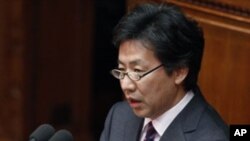The Bank of Japan says the world's third-largest economy, will contract this fiscal year by four-tenths of one percent. The forecast is a significant reversal from earlier predictions that Japan's gross domestic product would rise three-tenths of a percent in the year ending March 31. VOA Correspondent Steve Herman reports from our Northeast Asia bureau in Seoul.
On the day Japan's central bank reversed its economic forecast, some of Japan's political leaders are urging lawmakers to take action to avoid economic catastrophe.
Prime Minister Yoshihiko Noda, in a policy speech Tuesday to the parliament, decried what he called "indecisive politics". Mr. Noda says Japan is overwhelmed with challenges - primarily the stagnant economy and recovery from the earthquake and tsunami in the
northeast last March which caused the Fukushima nuclear reactor meltdowns.
Mr. Noda says, for the good of the country, it is imperative for all political parties and his administration to cooperate to enact tax hikes to sustain the social security system in an era of chronic deflation.
Japan faces a rising number of retirees and elderly while a low birth rate and a restrictive immigration policy narrow the pool of workers paying into the pension system.
Japan's public debt now accounts for about 200 percent of its gross domestic product.
Finance Minister Jun Azumi told lawmakers Japan could soon experience the same type of sovereign debt crisis affecting Europe.
But the warning has not prompted any immediate indication of compromise among the opposition bloc. It controls the less-powerful upper house of parliament. Opposition leaders have rebuffed calls for preliminary talks by the governing Democratic Party of Japan on a
proposal to increase the consumption tax rate in two stages.
The conservative Liberal Democratic Party, which governed for most of the post-World War II era, wants a general election instead, which it hopes would return it to power. It says a snap election is necessary to get the public's mandate on raising taxes.
Japan Proposes Tax Hike to Help Fund Social Security System




